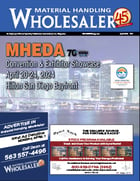
Waiting on the tax man
Here I am attending a Currie Performance Group meeting waiting on Congress to make up their mind about a tax bill spelling out the new simplified tax code that is supposed to save us a chunk of cash we can then spend to provide a spike in the economy.
This has been a very frustrating week because I asked my dealer tax guy, Steve Pierson, to address the performance group regarding the new bill, with the thought that there may be some tax planning action the attendees could implement before year end. To make matters worse, I was supposed to outline the tax bill for you in this month’s article with the same goal in mind, to give you a heads up about any last minute transactions to complete in 2017 that would reduce your 2017 tax bill. The problem is we don’t have a final Senate plan as I write this because one Senate member is holding up the bill for whatever reason, thus holding up the process of reconciling both bills to arrive at a final bill to send to the President for signature.
So on to Plan B we go. Mr. Pierson has been kind enough to provide a comparison of our current code against the latest Senate bill (which is still in limbo) and the House bill on the table. This is still a very moving target so I will use Steve’s work to highlight areas dealers should be concerned about. To help you follow along I have asked Kathy Regan to attach a copy of Steve’s presentation to MHW’s website. But keep in mind we are working with two bills that are still a work in process. Once we have a final version I will update this discussion using the final version.
So the question of the day becomes …Will this new tax bill save me some money? And the answer is……………………..
Probably. Dealers should pay less in taxes if their dealership is a flow-through entity (LLC or S-Corp), and if the dealership is a C Corp it should pay less tax as well. How much will you save is obviously relative to how much you make and what other sources of income you have.
A number of you will be asking if you should switch their flow-through entity to a C-Corp. Good question, but one that is beyond the scope of this article because even though a C-Corp pays less tax there are other complications that offset the immediate tax benefits, with the major one being the potential double tax you pay taking distributions out of a C Corp. I would suggest not letting the tax tail wag the dog because there are plenty of tax planning opportunities in these bills to get you where you need to be.
Here are the tax issues dealers’ needs to understand
State and local taxes – only small amount allowed with the possibility that they are no longer deductible at all.
Mortage interest – Could be reduced from where we stand now.
NOL deduction – No more carrybacks….only carry forwards. (This could be big deal for some)
Like-kind exchanges – Eliminated for all but real property…. A big deal if you use this tool to defer gains on sale of used equipment.
Interest expense – Limitation on what you can deduct. This will get complicated depending how the bill winds up.
Bonus depreciation – 100% bonus for new and maybe used depreciable assets. Some strange exclusion language dealing with floor plan interest.
SEC 179 – Limit to increase to at least $1 million
Flow-through tax rates – Two different plans that are supposed to get you to the equivalent of the 20% rate on C-Corps. You will have to run your numbers to see how it works. Examples are provided in the Powerpoint exhibit on the website. Lower rate may be delayed until after 2018.
Cash basis accounting – I don’t get it but they are suggesting that smaller companies could use cash basis accounting. No more inventories on your books….??
AMT- repealed. If you pay AMT this alone will generate tax savings.
The flow-through examples show a reduction compared to the current program. Nothing to write home about but with the new limits on Bonus and Sec 179 you really have more ways to reduce taxable income. For example, a family with $250,000 in wages and $250,000 of flow through income could save $30,000 in taxes. Not bad, but remember that you now have more options to reduce the flow-through income that could make the change larger.
BOTTOM LINE—-YOUR TAX CALCULATIONS GOING FORWARD WILL CHANGE. YOU WILL HAVE TO RUN THE NUMBERS TO SEE WHERE YOU STAND AND WORK FROM THERE TO DETERMINE WHICH NEW OPTIONS WORK FOR YOU. BUT IF YOU DON’T HAVE YOUR OWN STEVE PIERSON YOU BETTER FIND ONE.
ALERT-ALERT-ALERT- As important as it is to get a handle on the new federal tax laws, it is just as important to review your state and local tax laws to see how they work with the new federal rules. Nobody likes surprises on April 15, especially if the surprise could have been avoided. And as long as you are seeing how the federal rules interact with the state and local rules it is probably a good idea to give your state and local tax position a hard review to make sure you are not overpaying or handling dealer transactions the wrong way to the detriment of your wallet. This is especially true if you operate in multi tax jurisdictions because it is easy to think you apply all transactions the same way when in fact that is not the case. Hopefully you work with a professional state and local tax person. Do not assume that the person doing the federal work knows the state and local rules as well as a SALT (State and Local Tax) person does. If you are dealing in multiple states a true SALT professional is worth their weight in gold.
There you are…a short version of how the new tax bill will impact dealers. We will have the PP slides on the MHW website along with some worksheets that show the tax savings for those with flow-through entities. But please remember these are examples which assume the dealer taxable income could not be offset by Bonus or Sec 179. We will add one to show the difference between C-Corp and Flow-through using the same assumptions.
Any questions that are dealer related, please call me and I will follow up with my dealer tax people, both federal and SALT.
You can add tax planning to your list of things to do in 2018. Take your time and do it right.
Garry Bartecki is a CPA MBA with GB Financial Services LLC. E-mail [email protected] to contact Garry.









